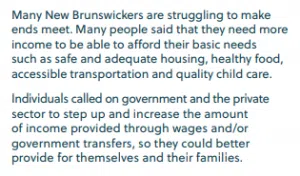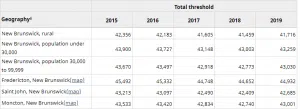Some advocates in New Brunswick see the province’s five-cent minimum wage increase on April Fools’ Day as nothing more than a joke.
Abram Lutes, the provincial coordinator of the New Brunswick Common Front for Social Justice, said an hourly wage of $11.75 is not enough progress.
“Even a $15 is sort of a starting point and it’s true that even in New Brunswick that’s behind a living wage in some parts of the province so we should be looking towards even a $20 minimum wage,” he said.
Lutes said the low-wage workers they’ve heard from about this increase feel patronized by the provincial government.
He said the provincial government needs to review their priorities and pursue a living wage.
Lutes said there’s an assumption everyone paid minimum wage is working full-time hours, but that’s not always true due to shift work and flexible work allotting to be lower than full-time wages.
He said people often argue that minimum wage increases will cost small business owners, but data shows after minimum wages go up, there’s a net benefit to the province because people have more disposable income.
Lutes said a concern of the short-term bottom line makes companies raise objections about an increase to minimum wages even if they can afford it.
“I think the government has adopted this mindset and listened to it over a more holistic approach and especially in New Brunswick there’s been a lot of business pressure on provincial policy that I think governments need to start standing up to,” he said.
Lutes said the premier has been talking about how well-positioned we are for a recovery from the pandemic but “the benefits from the economic recovery won’t be shared equitably if we don’t have labour standards to ensure people are able to live and work with dignity.”
He said paid sick days, workplace safety and job security are also needed for all workers in the province.
“$13.50 would break the poverty line but for us the idea of the minimum wage is that it sets a floor price for labour that is livable, not just breaking even but people able to actually live a full life and pay for rent and food and necessities and a little bit extra and provide for dependents,” he said.

From the Overcoming Poverty Together
The New Brunswick Economic and Social
Inclusion Plan 2014 – 2019
Final Report, Fall 2020
Post-Secondary Education, Training and Labour Minister Trevor Holder said in the future, the minimum wage rate will remain indexed to New Brunswick’s consumer price index, rounded to the nearest five cents. Manitoba ($11.90 per hour), Newfoundland and Labrador ($12.50 per hour), and Yukon ($13.85 per hour) also link the minimum wage to the consumer price index.
According to the Economic and Social Inclusion Corporation, in 2008-09, the average cost of shelter in the province is $9,124 annually while the cost of food annually is $6,082. At that time, 13.8% of New Brunswickers lived in poverty.
The New Brunswick Economic and Social Inclusion Plan said the goal is to reduce income poverty by at least 50 per cent by 2030.
As of 2018, 58,000 New Brunswickers (7.9%) were living in poverty according to the Market Basket Measure (MBM), and New Brunswick had the second-lowest median wage rate in Canada. The MBM for New Brunswick has not deviated greatly since 2015.

The MBM for New Brunswick has not deviated greatly since 2015. (Photo: Statistics Canada Screengrab)
Data shows minimum wages in the province would need to rise to $13.50 an hour just to hit Canada’s official poverty line for one person’s income. The median rate for an hourly wage in Canada is $24.04 an hour.
According to the Saint John Human Development Council, a living wage for Saint John would be $19.55, which yields an annual household income of $69,000.
The council calculated a living wage by viewing how a household could afford basic needs after government transfers such as federal and provincial child benefits and deductions such as income taxes and employment insurance premiums.
In the 2016 Poverty in New Brunswick report, Rothesay had the lowest count of people in poverty at 920 while Westmorland County was the highest with 19,140 people.




